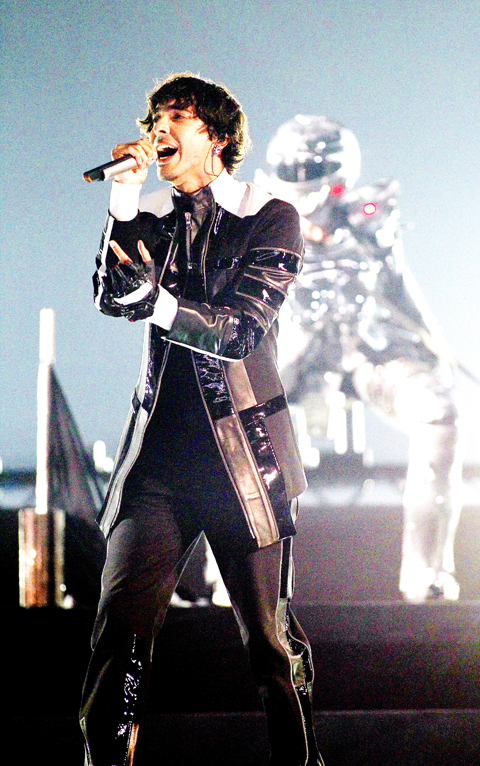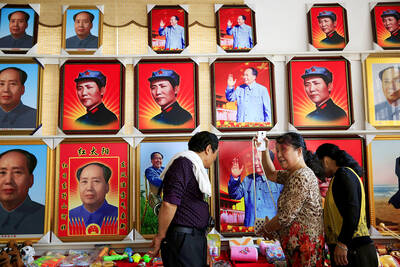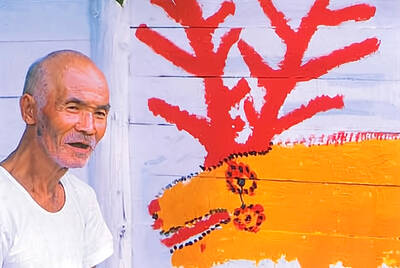Nineteen-year-old German Lena won the 55th Eurovision song contest with the British-styled pop number Satellite on Saturday, beating 24 other contestants in one of Europe’s most watched TV programs.
Lena, the second German winner of Eurovision, was an unknown before she won Germany’s qualifiers for the contest and delighted the crowd in the Norwegian capital Oslo with her youthful and energetic personality.
“This is so absolutely awesome. I feel that this is not real,” said the teenager, whose full non-stage name is Lena Mayer-Landrut.

PHOTO: AGENCIES
“I’m kind of freaking out. This feels incredibly good.”
Eurovision, which drew 124 million viewers last year, parades a wide array of musical styles in original songs, mostly from relatively unknown artists.
In the self-proclaimed European song championships, flag-draped fans and outrageous outfits are par for the course and contestants mix glitz and kitsch, ballads, rock ‘n’ roll and disco to lure the highest number of votes.

PHOTO: AGENCIES
But unlike past years when polished and glamorized American-style performers took center stage, Lena’s fresh and uncontrived style appealed most.
To promote talent over politically and geographically motivated bloc voting, which has in the past decade mainly rewarded Eastern European countries, professional judges now account for 50 percent of a performer’s score.
The other half comes from the number of telephone and SMS votes each contestant receives, with fans unable to vote for their own country’s entry.

PHOTO: AGENCIES
Nevertheless, as in earlier years, regional blocks played a huge role in attributing points: Greece gave the maximum of 12 points to Cyprus who returned the favor; Serbia gave its points to Bosnia-Herzegovina, while Belarus’ top marks went to Russia. On the other hand, Russia gave 10 points to Georgia, with whom it was at war less than two years ago.
Lena, who is awaiting her high school exam results, bubbled with spontaneity and charm, asking the hosts “Do I have to sing now?” when she was awarded the top spot after votes from 39 countries were counted.
She performed in a tight short black dress, singing a catchy modern love song that included the lyrics: “Love my aim is straight for you, Cupid’s arrow is just for you, I even painted my toenails for you, I did it just the other day.”
When the Hanover native entered the Eurovision preliminaries in Germany, she did not tell her friends “so there wouldn’t be any stupid comments if I got kicked out straight away”.
Before then she had trained only as a dancer, shot homemade videos and had a few attempts at singing with a school band.
The show was one of the most expensive Eurovision contests, with Norwegian broadcaster NRK spending US$33 million and having to sell its rights to the soccer World Cup to finance the event.
Four countries had to drop out because of funding woes — the Czech Republic, Montenegro, Andorra and Hungary.
Germany last won the contest in 1982 and as this year’s winner, will host the show next year. Turkey and Romania came in second and third out of the 25 countries in the final.
France, which has not won the Eurovision since 1977, came in 12th, and the UK was last.

The ultimate goal of the Chinese Communist Party (CCP) is the total and overwhelming domination of everything within the sphere of what it considers China and deems as theirs. All decision-making by the CCP must be understood through that lens. Any decision made is to entrench — or ideally expand that power. They are fiercely hostile to anything that weakens or compromises their control of “China.” By design, they will stop at nothing to ensure that there is no distinction between the CCP and the Chinese nation, people, culture, civilization, religion, economy, property, military or government — they are all subsidiary

It’s always a pleasure to see something one has long advocated slowly become reality. The late August visit of a delegation to the Philippines led by Deputy Minister of Agriculture Huang Chao-ching (黃昭欽), Chair of Chinese International Economic Cooperation Association Joseph Lyu (呂桔誠) and US-Taiwan Business Council vice president, Lotta Danielsson, was yet another example of how the two nations are drawing closer together. The security threat from the People’s Republic of China (PRC), along with their complementary economies, is finally fostering growth in ties. Interestingly, officials from both sides often refer to a shared Austronesian heritage when arguing for

Nov.10 to Nov.16 As he moved a large stone that had fallen from a truck near his field, 65-year-old Lin Yuan (林淵) felt a sudden urge. He fetched his tools and began to carve. The recently retired farmer had been feeling restless after a lifetime of hard labor in Yuchi Township (魚池), Nantou County. His first piece, Stone Fairy Maiden (石仙姑), completed in 1977, was reportedly a representation of his late wife. This version of how Lin began his late-life art career is recorded in Nantou County historian Teng Hsiang-yang’s (鄧相揚) 2009 biography of him. His expressive work eventually caught the attention

Late last month the Executive Yuan approved a proposal from the Ministry of Labor to allow the hospitality industry to recruit mid-level migrant workers. The industry, surveys said, was short 6,600 laborers. In reality, it is already heavily using illegal foreign workers — foreign wives of foreign residents who cannot work, runaways and illegally moonlighting factory workers. The proposal thus merely legalizes what already exists. The government could generate a similar legal labor supply simply by legalizing moonlighting and permitting spouses of legal residents to work legally on their current visa. But after 30 years of advocating for that reform,